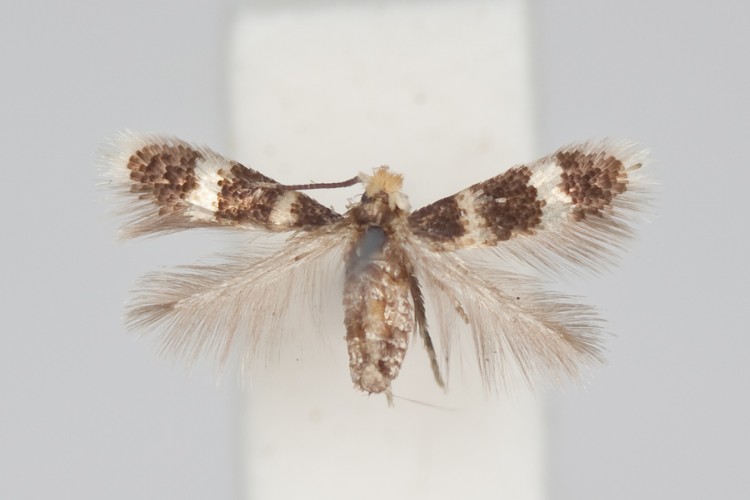This Monday I am departing from the usual Arctiinae for something completely different – a microlep! This is a Nepticulidae, Stigmella diffasciae, and it measures in at a whopping 6 mm. I can’t take credit for spreading this moth – all of the nepticulids I have photographed are from the California Academy of Sciences and spread by Dave Wagner while he was here for a postdoctorate position.
The caterpillars mine the upper-side of the leaves of Ceanothus and are known only from the foothills of the Sierra Nevada in California. If you’re so inclined the revision of the North American species of the genus is freely available here (.PDF).


I could almost get interested in microleps, just for the challenge of getting good at spreading them.
It’s interesting – the scales don’t seem to have gotten tiny in proportion to the moth.
I like the sound of that! You did notice one of the amazing characters of this family, their scales seem to have remained normal size. Those orange tufts on the head are also huge scale eye-caps that nearly cover the entire eye.
Niin, I’m guessing this is an example of a flying bug SO SMALL that the physics it deals with are different, so the wings are different than they would be on a comparable-but-much-larger moth? Or is that not quite happening at this scale? I can’t remember what high relative viscosity of air does to wings.
Hm… Now I’m thinking the wings start to look more like oars on super small fliers vs. feathery like this?
Niin, how’s THAT for a wandering comment. =)
I think you are correct, that once you get this small the moth ends up “swimming” through the air more than flying. Many micros have increased their wing surface using long scales instead of a solid surface, I bet the greater surface area helps with flight. I do know there are some impressive wasps that are much smaller than this moth and have even less wing-like wings! I don’t know the physics at all though…
[…] Heinäkuu 26, 2011PCS Phosphate: Participation is necessary, whether or not it’s required July 25, 2011Monday Moth July 25, 2011Hiatus July 25, 2011PCS Phosphate: Air quality permit sees light of day, stinks July […]